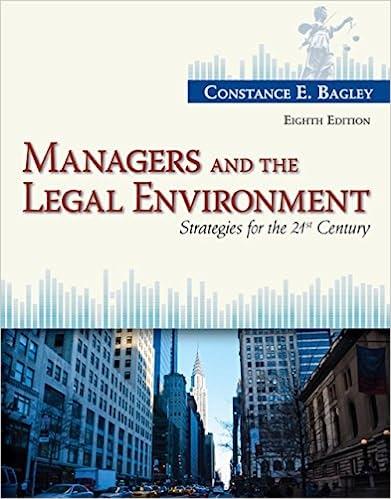Firefly Corporation needed capital for product development. On May 26, 2009, Firefly held a board meeting at
Question:
Firefly Corporation needed capital for product development. On May 26, 2009, Firefly held a board meeting at which it was anticipated that a quorum of the board would vote to accept an equity investment offer from Trident Capital. (The deadline for accepting the Trident offer was May 26, 2009.) Siamik Mirhakimi, a “senior executive” and board member of Caterpillar, Inc. and another individual from Caterpillar, who was not a board member, attended the meeting. According to a complaint filed later by the CEO of Firefly, “Caterpillar executives authorized Mr. Mirhakimi and [the other Caterpillar representative] to attend the Board meeting to make a presentation and offer on its behalf regarding an equity investment by Caterpillar in Firefly." At the meeting, Mirhakimi "expressly stated that he had 100% authorization from Caterpillar" to make an investment in Firefly. Because the terms of Caterpillar's offer were better than the terms offered by Trident, Firefly's board voted to accept the Caterpillar offer.
Shortly thereafter, Caterpillar informed Firefly that it had decided not to make the investment. Because Firefly could not raise capital elsewhere, it ultimately filed for bankruptcy. The CEO of Firefly (to whom the rights, claims, and causes of action of Firefly against Caterpillar had been sold) subsequently sued Caterpillar, alleging claims for intentional misrepresentation and anticipatory breach of contract. The intentional misrepresentation claim hinged on whether the CEO could sufficiently plead that Mirhakimi had actual implied authority or apparent authority.
The CEO alleged that Mirhakimi "was a senior executive" at Caterpillar. Does that allegation show implied authority to commit to an investment? What other actions could Mirhakimi have performed to show implied authority? The CEO also attempted to show that because the second representative from Caterpillar attended the board meeting with Caterpillar's approval, he had implied authority to commit to the investment. Does that allegation show implied authority? If yes, how? If no, what other facts would be required to show such authority? In support of his apparent authority theory, the CEO alleged that Caterpillar "engaged in words that created the appearance of apparent authority through its express agents" and that apparent authority was also created because Caterpillar "sen[t] Mr. Mirhakimi and [the other Caterpillar representative] to the Firefly Board meeting to make the investment presentation." Do these actions create apparent authority? How could Caterpillar have avoided this litigation? Did it act ethically?
Step by Step Answer:

Managers And The Legal Environment Strategies For The 21st Century
ISBN: 9781285860374
8th Edition
Authors: Constance E. Bagley





